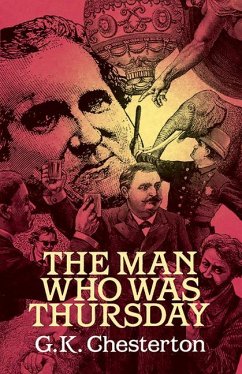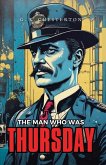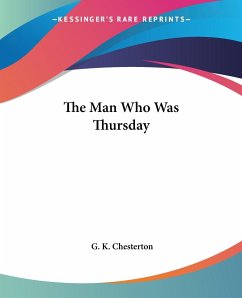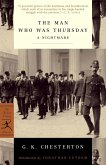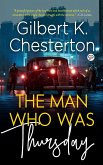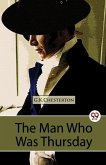"... An extraordinary book, written as if the publisher had commissioned him to write something rather like The Pilgrim's Progress in the style of The Pickwick Papers."--Msgr. Ronald Knox Perhaps best known to the general public as creator of the "Father Brown" detective stories, G. K. Chesterton (1874-1936) was especially renowned for his wit, rhetorical brilliance and talent for ingenious and revealing paradox. Those qualities are richly abundant in the present volume, a hilarious, fast-paced tale about a club of anarchists in turn-of-the- century London. The story begins when Gabriel Syme, a poet and member of a special group of philosophical policemen, attends a secret meeting of anarchists, whose leaders are named for the days of the week, and all of whom are sworn to destroy the world. Their chief is the mysterious Sunday--huge, boisterous, full of vitality, a wild personage who may be a Chestertonian vision of God or nature or both. When Syme, actually an undercover detective, is unexpectedly elected to fill a vacancy on the Anarchists' Central Council, the plot takes the first of many surprising twists and turns. The poet/sleuth is soon caught up in a deadly scheme to bomb a meeting in Paris of the Czar and the President of the French Republic. The story grows steadily more bizarre, at the same time serving as a vehicle for Chesterton's philosophical, political and religious speculations, cloaked in cheerful irreverence, and pointed wit: "You've got that eternal idiotic idea that if anarchy came it would come from the poor. Why should it? The poor have been rebels, but they have never been anarchists; they have more interest than anyone else in there being some decent government. The poor have sometimes objected to being governed badly; the rich have always objected to being governed at all." Such perceptions, expressed with profound good humor, add a delightful dimension of interest to this inventive and readable allegorical puzzle. In Dover's inexpensive paperbound edition, completely reset in new type for easier reading, The Man Who Was Thursday will delight any reader who relishes clever plotting, delicious irony and rousing adventure in a novel in which"...the wisdom flashes out in star-showers: (Baker and Packman, A Guide to the Best Fiction).
Hinweis: Dieser Artikel kann nur an eine deutsche Lieferadresse ausgeliefert werden.
Hinweis: Dieser Artikel kann nur an eine deutsche Lieferadresse ausgeliefert werden.

